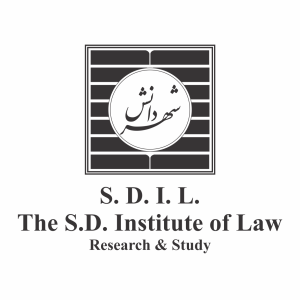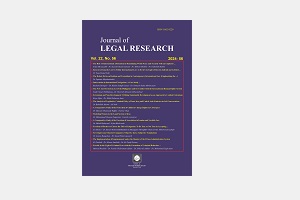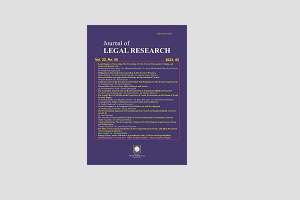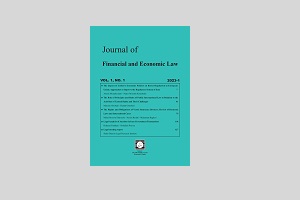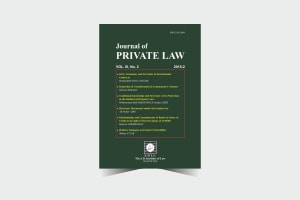Journal of
Legal Research
Number 19
Vol. X No. 1
Spring – Summer 2011
ISSN: 1682-9220
Managing Editor: Vahid Eshtiagh
Editor-in-Chief: Seyyed Ghasem Zamani
CONTENTS
Articles
ICC Arbitration Rules on Multiple Parties and Multiple Contract
Javad Kashani (Ph. D.) & Mahdi Sheykhiani
The Concept and the Causes of Divorce in the Legal System of Iran and English Law
Hossein Simaei Sarraf (Ph. D.) & Maryam Fakharian
Some Considerations on the Compensation for the Nuclear Damages Based on International Conventions of Nuclear Civil Liability
Alireza Yazdanian (Ph. D.) & Hedieh Habibian
The Protection of Traditional Medicine in Quran and Islamic Jurisprudence
Mahdi Zahedi (Ph. D.) & Samira Gholamdokht
Individual and Social Rights in the Criminal Procedure: Some Challenges
Djamshid Gholamloo
The Concept of Representations in the First Assembly (Mashruteh)
Seyed Naser Soltani
Special Issue:
105 Years of Legislation xperience in Iran
The Protection of the Principle of Transparency by Constitutional Courts
Mohammad Reza Vijeh (Ph. D.)
Law Approach Challenges: Law Validity and Law Reliability
Davood Sirus (Ph. D.), Mirza Ali Saboorynia & Jabrail Marzi Alamdari
The Relationship between Rule of Law and Religious Law in Mashruteh Legal System
Hoda Ghaffari (Ph. D.)
The Place of Simile in the Process of Codification of Law
Mohammad Hassan Emamverdi
A Brief Study on the Theoretical Foundations of Experimental Legislation
Vahid Agah
The Approach of Legislation in Electronic Contracts
Gholamnabi Feyzi Chakab (Ph. D.) & Ebrahim Noshadi
Measuring the Strength of Iran’s Patent Rights by Focusing on Iranian Patent Act 2008
Mahdi Ebrahimi
Critique and Presentation
On the Title of Criminal Law
Ghassem Mohammadi (Ph. D.)
An Analysis of Judgment of the European Court of Justice in Case of Fulmen and Mahmoudian: When the Dream of Judicial Review of UN Sanctions Comes True
Mona Sadat Mirzadeh
Articles
ICC Arbitration Rules on Multiple Parties
and Multiple Contract
Javad Kashani (Ph. D.) & Mahdi Sheykhiani
Abstract:
International commercial arbitration as private settlement disputes solution plays an important role in international multiple Contracts. Multiple arbitrations which have divergence kinds are known as complex issues at arbitration law and are not well-known both in international and domestic law, but in Third section of ICC arbitration new rules (article 7-10) wildly are considered. Subject to those rules a party wishing to join an additional party to the arbitration shall submit its request for arbitration against the additional party (the “Request for Joinder”).
Multi-parties arbitration, (joint venture and consortium) and claims arising out of or in connection with more than one contract (relations between main contractor with second and third contractors) may be made in a single arbitration, irrespective of whether such claims are made under one or more than one arbitration agreement.
Finally the Court may, at the request of a party, consolidate two or more arbitrations pending under the Rules into single arbitration. In multi-parties arbitration where there are multiple claimants or multiple respondents, and where the dispute is to be referred to three arbitrators, the multiple claimants, jointly and the multiple respondents, jointly, shall nominate an arbitrator and the third arbitrator, who will act as president of the arbitral tribunal, shall be appointed by the Court.
Keywords: International Commercial Arbitration, Joinder of Additional Parties, Multiple Parties, Multiple Contracts, Consolidation of Arbitrations
The Concept and the Causes of Divorce
in the Legal System of Iran and English Law
Hossein Simaee Sarraf (Ph. D.) & Maryam Fakharian
Abstract:
The concept of divorce in Iran and England’s legal systems usually are the same. But its nature is different in each system of another. Because, in Iranian law – accordingly to Shari’ah a divorce is the sole right of the man and the woman just by the proving of the legal causes may request the divorce from the court and finally it is the man that make a divorce although if he refuses to divorce the woman the court would intervene. Though According to England law the man and woman have equally right to a divorce and the man doesn’t have any privilege to woman. Each of them by proving one of the legal divorce causes may request divorce from the court. On the other hand, the legal causes of divorce in two systems have a storage resemblance.
Keywords: Divorce, Concept, Causes, Iran, England, Law
Some Considerations on the Compensation
for the Nuclear Damages Based on International
Conventions of Nuclear Civil Liability
Alireza Yazdanian (Ph. D.) & Hedieh Habibian
Abstract:
The development of industry and technology is considered as effective factors to evolve law of civil liability. The nuclear technology has played a significant role in this way, so the nuclear accidents in recent century and the potential risk for using radioactive materials, has encouraged the governments and international societies to set up devices in order to prevent happening these events and enact procedural rules for bringing an action of compensating resulting from such damages which leads to organize international conventions of nuclear liability. On the one hand, the mentioned conventions have facilitated prosecution of the defendant for compensating nuclear damages by introducing some principles such as the strict liability principle and channeling of liability to operator principle, and on the other hand, they have predicted the 10-year and 30- year prescriptions for claims of compensation by making distinction between physical damages due to nuclear incidents and other kinds of damages. Equivalent to those regulations, the codifiers of international conventions of nuclear liability have played a significant role to accelerate legal procedures of such claims by determining the principle of exclusive jurisdiction of local court of nuclear event and by applying rule of competence unity and also presenting the law of competent court as a applicable law on claims.
Keywords: Claim for Compensating for Nuclear Damage, Operator of Nuclear Installations, Prescription (Laps of Time), The Principle of Exclusive Jurisdiction, Applicable Law
The Protection of Traditional Medicine
in Quran and Islamic Jurisprudence
Mahdi Zahedi (Ph. D.) & Samira Gholamdokht
Abstract:
Traditional medicines are being used as complementary medicines in the health sector. Indigenous peoples depend on traditional knowledge for their livelihoods and well-being and so they can manage and exploit their local ecosystems. Local communities also depend on traditional medicines for their primary health care. If traditional knowledge is protected and commercialized, individuals, communities and national economies will benefit. The vast country of Iran is rich in diversity and there is a need to update its law, including the Intellectual property laws, in order to protect this diversity. However the protection of Intellectual property including Traditional Medicine is a newly occurred problem in the Islamic law. The Islamic jurists do not have the same idea about accepting or rejecting of Intellectual property as a property and it has become a topic of numerous controversies among them. As regard to the necessity of being in accordance to Shari’ah for all laws. The purpose of this article is to prove the legitimacy of protection of Traditional Medicine under Koranic verses and in the bases Islamic jurisprudence.
Keywords: Intellectual Property, Traditional Medicine, Quran, Islamic Jurisprudence, Islamic Law, Health Care
Individual and Social Rights
in the Criminal Procedures: Some Challenges
Djamshid Gholamloo
Abstract:
This paper discuss about the conflict between community interests and the rights of individuals involved in criminal justice, especially the accused and suspects and how make necessary balance between them; That means in the criminal justice entities, including judicial officials and the media referring to the fundamental right freedom of expression and information in order to observe the public interest and benefit, their right to express and disclose information about suspects, accused of crimes charges and consider them. On the other hand, the suspect and charged based on their inalienable rights, namely the right to assume the innocent and the right to privacy, free speech right to run an absolute barrier implementation know their rights. This paper has been on the examination Iran laws and Case law, the laws of some countries and international and regional documents and particularly European Court of Human Rights Case law as a specialized agency in the judicial investigation in human rights, legal bindings or modify these rights should be presented.
Keywords: Freedom of Expression, Presumption of Innocence, Privacy, Public Interest, Criminal Procedure, Conflict of Rights, Balance, Defendant, Suspect
The Concept of Representation
in the First Assembly (Mashruteh)
Seyed Naser Soltani
Abstract:
Initially, the concept of “Representative” emerged in the first Assembly. Prior to the Constitutionalism era, the concept was considered as a precarious notion which constitutionalists argued on the notion just behind closed doors. In the post Constitutionalism era, when the right and role of Iranian citizens in law-making and monitoring of public affairs were recognized, with no alternative, the new system was compelled to furnish the way for realization of the right and role of the citizens. Representative was a concept that realized the new status of Iranian citizens. It was decided to elect representatives of each group in every province due to inconvenience of summon up all the citizens. Although elected by class and trade group election, the representatives decline to assume their selves as the representatives of their relevant city or trade group. In the beginning, they presumed their selves as the “delegate of 15 million people” and “representative of the entire nation”. Despite the fact that the concept of “Representative” in Constitutionalism era was introduced through the notion of “Representation” in the context of Islamic religious law, but the resemblance was merely a literal intersection, though each of them contained non-identical content and subject. Considering the discussions of representatives of the first Assembly, the process of “Representative” notion emergence and its progressive separation with the concept of “Representation” in private law will be examined in the present paper.
Keywords: Representative, First Assembly, Mashruteh, Separation of Powers, Constitution, Constitutionalism
The Protection of the Principle of
Transparency by Constitutional Courts
Mohammad Reza Vijeh (Ph. D.)
Abstract:
One of the axes of legal norms development must be observant of interests of Law subjects. Consequently, the citizens must be informed of their rights and duties and can expect the results of their legal acts. Therefore, the principle of Legal Security, as one of the criterions of Rule of Law, guarantee the stability of the legal system, permanent protection of citizens rights and liberties, definiteness of norms of the legal system and the confidence in that system. Also, the principle of transparency, as one of the subordinate principles of principle of Legal security, is included in the guarantor principles the quality of Laws and the legal system. These principles involve the criterions of clear rights and duties in Acts. Meanwhile, the Constitutional Courts, with their place in the legal system, have an important role in the guarantee of the principle of transparency. These Courts control the different aspects of Laws transparency and connect this principle with the other principles of Constitutional Law.
Keywords: Transparency, Legal Security, Constitutional Courts, Control, Quality
Law Approach Challenges:
Law Validity and Law Reliability
Davood Sirus (Ph. D.), Mirza Ali Saboorynia & Jabrail Marzi Alamdari
Abstract:
Because of the expansion in the law field and also conceptual and visionary nature of it, there is a no totally accepted definition between experts in this field. It has caused to change in debates toward law characteristics which agreements here are much but in the issue of importance, priority and relativity of characteristics there is not such an agreement and debates are open. By definition of law, it represents law(s) characteristics in the three comprehensive law validity, law reliability and practicability dimensions, to decrease confusions, helping to better understand and to have a better and reasonable law system. Also law validity is divided in to two main internal and external validity dimensions. Finally it has deduced law’s validity and law’s reliability as essence characteristics, the possibility of deficiency in laws at all levels and the need and necessity of courts independence.
Keywords: Internal Validity, Law Reliability, Law Characteristics, External Validity, Law Philosophy
The Relationship between Rule of Law
and Religious Law in Mashruteh Legal System
Hoda Ghaffari (Ph. D.)
Abstract:
The Survey of Relationship between Rule of law and Religious law is a controversial topic; this study is more highlighted when it is done regarding constitutional revolution which is resultant of coalition between religious and modernist sides of society. Religious persons were supporting constitutional revolution because of their special motivations such as achieving the good governance in order to executing the religion commandments, and cutting the strangers interference; while the modernists were fighting for realization of the concepts such as constitution, freedom, and finally modern state establishment. Constitution event which resulted in transition from traditional period to modern period and reinforcement of people role in decision making procedures is an intellectual challenging subject; power structure before Constitution revolution was completely traditional, but after that because of law orientation and parliament centrality matters, especially limiting the king powers leaded to deep disagreements which resulted in different theory generation about probability of coexistence between tradition and modernity or their manifestations such as religion and law. This paper intend to Survey of Relationship between Rule of law and Sovereignty of Religious law in constitutional legal system.
Keywords: Constitutionalism, Rule of Law, Sovereignty of Religious Law, Freedom
The Place of Simile in the
Process of Codification of Law
Mohammad Hassan Emamverdi
Abstract:
The simile is one of the methods of thought expression. Its origin is on the knowledge of rhetoric. There are the structures and sorts of the literary simile in legal simile but the legislator has fostered it in own needs. This method has wide usage in the legislation. The important profit of this method is in brevity of law. It is occasionally used for regulation and justification of legal order. Knowing of this method help to better understanding of the law and make that the art of legislation is developed too. In this article the interdisciplinary study has done and examined the problems of it.
Keywords: Simile, Legislation, Interpretation, Regulation, Legislator
A Brief Study on the Theoretical
Foundations of Experimental Legislation
Vahid Agah
Abstract:
Since the emergence of law, Legislation in parliaments has always been associated with change and amendment. A situation with denotes the non-permanency of laws and their relative stability. But, with the emergence of experimental laws this issue has taken a more tangible appearance and the legislator specifies the precise date of reviewing. An issue which is accompanied with evaluating the law during the execution. In this text while investigating the legislator’s approach, before and after experimental laws and by relying on two elements which distinguish these laws from other approvals of the parliament namely emphasizing on being temporary and evaluation, investigates the theoretical foundations of this legislation method.
Keywords: Experimental Law, Stability and Permanency of Laws, Temporary, Evaluation, Prelegislation Study
The Approach of Legislation
in Electronic Contracts
Gholamnabi Feyzi Chakab (Ph. D.) & Ebrahim Noshadi
Abstract:
The electronic Contracts have been subject to global, regional and domestic legislation. The main aim is to facilitate electronic commerce and omit barriers to its growth. On the other hand, lawmakers that regulate rules governing electronic contracts are face with two conflict factors; 1: consumer’s protection provision and need to General unification rules for the growing globalization of trade. Legislators are faced with the question whether they need a new set of rules in this regard or the traditional contract law is sufficient? In this new environment, legislation should adopt consumer protection policy or universal feature of network should be attended and take a unification general rules for trade in cyberspace. This article reviews legislation methods of the regulators at the international, regional and local level regarding electronic contracts
Keywords: Electronic contract, law, technological neutrality, functional equivalence
Measuring the Strength of Iran’s Patent Rights
by Focusing on Iranian Patent Act 2008
Mahdi Ebrahimi
Abstract:
For studying the effects of IPRs, measuring the strength of intellectual property rights can be an important step and by making the protections of intellectual property rights quantitative one can study and classify each country’s level in protecting the granted rights. It’s also an important issue, in the common fields of law and economy to study these rights studies, especially for the global scope of the economic researches. The output data will help in many ways in analyzing countries promotion and making suitable decisions for both economic and politic affairs. This paper will first introduce the most general measuring indexes for the determination of intellectual property rights and then using the chosen one, namely GPI which is more accurate than others, the strength of Iranian patent Act 2008 will be measured.
Keywords: Iranian Patent Act, Intellectual Property, Patent, Property Rights, TRIPS
On the Title of Criminal Law
Ghassem Mohammadi (Ph. D.)
Abstract:
A branch of law which deals with crime and punishment is titled occasionally criminal law, punitive law and penal law. The latter title is selected on the base of crime examination, while the others are rested on the examination of the punishments. Considering the semantic forms of “Criminal” and the inadequacy of “Penal” to cover overall content of this branch of law, it appears that the term of “Criminal Law” is more appropriate for this research field to be titled with.
Keywords: Punitive Law (Punishment), Criminal Law, Penal Law, Titling, Iranian Penal Code
An Analysis of Judgment of the
European Court of Justice in Case of
Fulmen and Mahmoudian:
When the Dream of Judicial Review of UN Sanctions Comes True
Mona Sadat Mirzadeh
Abstract:
Norm conflicts between a UNSC resolution and human rights treaties have been the subject of several recent cases. The European court of justice recently had dealt with this subject in case of Fulmen and Mahmoudian v. Council of the European Union. Reviewing court’s decision in this case and other similar cases reveal that some human rights standards are under gable and even with broad power of Security Council; it must pay attention to these standards in the middle of adoption restrictive measures. In fact this is the first time that restrictive measures against Iranian individuals and companies has been annulled for the sake of derogation of human rights standards and this point is just one of the important dimensions of court’s decision.
Keywords: European Court of Justice, Restrictive Measures of S.C., Case of Fulmen and Mahmoudian, Case of Kadi, Case of Nada- Derogation of Human Rights Standards
